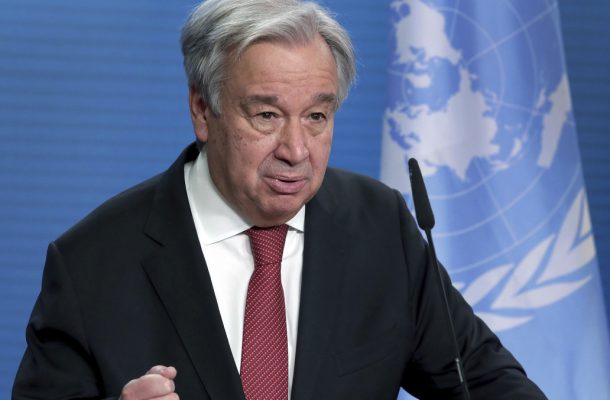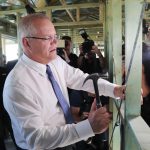Social justice for all

COP26, the latest international climate change conference, is well behind us, with the jury still out on whether countries will genuinely band together to address the global climate crisis, degraded oceans, and historic biodiversity loss. The COVID pandemic continues, leaving unacceptable numbers of lost and damaged lives in its wake.
Conflict rages still in Yemen, Syria and Ethiopia, driving millions to seek safety across borders. Tensions continue to mount in Ukraine and the South China Sea. The World Food Program assesses some 13 million people in the Horn of Africa are severely malnourished. The world is confronted by historically high refugee displacement, widening wealth disparities, and mass migratory movements.
As we navigate this complex environment, there remain potential solutions. Such solutions are the topic of arguably one of the most hard-hitting reports ever released by the UN General Assembly. On 16 November the UN General Assembly, including Australia, adopted the report authored by Secretary General Guterres, Our Common Agenda, by consensus.
At the heart of the report is a belief in the criticality of improving global cooperation to manage the world’s common resources — oceans, land masses and space — and public goods like global health. The goal is to safeguard the planet and its resources for future generations. The Agenda’s recommendations range from big-ticket issues like climate change, peace and disarmament, to more drilled down subjects, like international tax evasion.
The report proposes to increase accountability for human rights violations, with an interesting new focus on measures countries could take to reduce violence world-wide. The Agenda focuses on violence from criminal groups and interpersonal violence in the home, both of which, it asserts, kill more people collectively than large-scale violent conflict.
Some recommendations are uncontroversial, like gender parity initiatives, or measures to bring youth into the bigger conversations, while others could be more problematic, such as the call for a new dialogue on outer space or inviting former heads of state to lay out global governance options for the world’s resources.
Then there are recommendations, some new, others resurrected, that go to the heart of how the UN functions. Working towards a “UN 2.0” able to offer “system-wide solutions to 21st century challenges”, the report envisages an institution more inclusive, responsive, and consultative to ensure it is “a reliable guardian for our future.”
For those UN member states sceptical about “multilateralism with teeth”, as Guterres calls it, a report of this reach will be approached with caution. For others, it will be received as a timely and innovative document which intelligently maps the path ahead. Follow up is now in train, with Austrian Under Secretary General, Volker Turk, charged to spearhead it over the coming months.
As we ponder social justice in 2022 and beyond, we must ask — how will Australia engage with this initiative? Former head of DFAT, Frances Adamson, acknowledged that “an international rules-based order is in our best interests, and an effective multilateral system is the surest way to get there”.
Minister Marise Payne said in 2019, “We stand for an international order based on rules and cooperation, that upholds peace and prosperity for all nations.” The problem is a rules-based international order has proven more compelling for some global concerns than others. The next Australian government must seriously review how past policies are placed within this global strategy.
For instance, the clear preference for increased military spending over investment in conflict prevention, a reluctance to commit to serious goals and programs to halt climate deterioration, and domestic asylum policies which, counter-intuitively, undermine rather than shore up an effective global response to refugee outflows, require reconsideration.
It is worth giving some space to these extant policies, which are an outstanding contradiction of social justice and Our Common Agenda. There was a time when Australia was a leader in the development of international standards of refugee protection. Refugees were refugees, regardless of whether they fled en masse across the border into a neighbouring country, or whether they arrived seeking asylum.
The underlying premises of urgency of need and responsibility to respond were the same, and the protection regime was activated for both types of situations. The growth of mixed movements and the expansion in transnational crime and people smuggling has seriously eroded Australia’s commitment in this regard.
Together they fuelled a different response, based on clear distinctions between the refugee problem and the asylum problem, so that persons who fled in large numbers to their neighbours were responded to as refugees, while boat asylum seekers were called upon to rebut the presumption that they were illegal migrants.
Asylum seekers and migration control have become synonymous, with the preferred place for rights protection being outside the country’s borders. Deterrence, including indefinite detention regimes, are now at the centre of an asylum policy which rests on laws which have been stripped of any reference to the 1951 Refugee Convention.
In tandem, intake of refugees through resettlement programs has decreased and the settlement programs for regular arrivals have been cut back. For instance, in response to the Afghan crisis Australia offered Afghan refugees a mere 3000 places in its resettlement program, a number which pales in comparison to other developed states like Canada, who offered 40,000 places to those fleeing violence and persecution.
National responses found their reflection in Australia’s dealings on refugee challenges in the Asia-Pacific region. There was a nod towards regional cooperation arrangements, but the driver has been countering terrorism and transnational crime, not least through the Bali Process on Transnational Crime and People Smuggling, which Australia co-chairs with Indonesia.
One cannot take issue with countering terrorism and crime, but it shouldn’t be the main driver of multilateral cooperation around refugees. Large scale refugee arrivals in host countries, 80 percent of whom are in the developing world, bring with them huge burdens both calculable — financial costs —and incalculable — social harmony and security.
Providing support to refugees’ regions of origin, in an attempt to stabilise refugee populations and stop onward movements, falsely assumes that you can corral humanitarian disasters. This is rarely the case, particularly in ecologically fragile, underdeveloped border regions, which lack infrastructure and political stability, and where there is already competition among local communities for scarce resources like land or water. There is a fine line between responsibility sharing and responsibility shifting.
If Australia means what it says about upholding the international order as a system of rules and norms that apply to all, it must find a better alternative to a system which arbitrarily locks people up. A fair onshore refugee status determination process which does not discriminate among refugee claimants by method of arrival should be reinstated.
It is incomprehensible that refugees and asylum seekers still remain in indefinite detention under Australia’s watch, whether it be offshore or in Melbourne hotels. Their release should be an absolute priority. If the Nauru arrangement is to continue, it should be comprehensively reworked to ensure respect for due process, international responsibilities, and human decency, accepting that there will be some boat refugees who will be Australia’s responsibility.
The 1951 Convention must be reinstated as a central reference point. A more generous humanitarian intake program should be put in place. And the local narrative needs to be turned around, given a factual, less emotive base, to promote understanding not further obfuscation about, and alienation of, refugees in the broader society.
A Summit of the Future is foreseen for September 2023. One outcome would be a Declaration on Future Generations. The path to it is presently being carefully charted. It can be but hoped, with the federal election process now in train, that all contenders will take the time to familiarise themselves with Our Common Agenda and will commit to engage wholeheartedly and constructively with it.
This article was published by the Australian Institute for International Affairs.
Erika Feller is a Professorial Fellow in the School of Government at Melbourne University, and the former Assistant High Commissioner for Protection at the UNHCR. She is a fellow of the Australian Institute for International Affairs.












